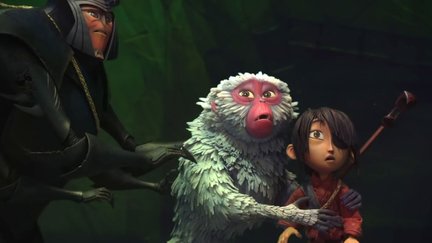The Kubo of the title (voiced by Art Parkinson) is a boy in ancient Japan, dedicated to his ill mother Sariatu (Charlize Theron). She tells him stories of his father, a great warrior who died fighting the evil Moon King and his monsters, and Kubo earns their living by telling those same stories in a serial fashion to the villagers, strumming out notes on his shamisen that magically animate props and characters out of stacks of origami paper. The most important stricture on Kubo's life is to get home before sunset, and when he inevitably misses his curfew, twin daughters (Rooney Mara) of the Moon King descend from the sky and attack his and his mother's cave home. Sariatu uses her powers to distract them, allowing Kubo to escape into the wilderness, where he must find three magical pieces of armor and face the Moon King once and for all. Aided in his journey by his formerly-wooden monkey doll now filled with his mother's voice and spirit, and an amnesiac giant beetle (Matthew McConaughey), Kubo embarks on his epic quest with the twin sisters close behind him.
The basic plot is not Kubo's greatest strength. It basically boils down to a series of McGuffin chases, and there are reveals that are treated as surprises but would only shock the laziest of viewers. Scene to scene and moment to moment, however, what's expected fades away against what is in front of the viewer right now. In making a tactile animated film, Knight creates a level of immersion in every frame. Each setpiece is dazzling in its execution and clever in its conception. Further cementing the viewer in the present is the sense that the characters are actually in danger, a feeling not easily communicated in most adventure stories. Knight is paying homage to fantastical directors like Guillermo del Toro in some scenes, and in others, he's crafting what feels like wholly original creatures. While watching, it's easy to get just as excited or apprehensive about the next location as Kubo himself, wondering what could possibly be around the next corner and then finding one's imagination outpaced by what the geniuses at Laika have devised.
The main characters don't necessarily wow like some of the other monsters, but they impress both as technical and creative achievements. Kubo is more than the standard kid protagonist. He certainly does have a level of playfulness and the requisite sense of adventure, but there's a melancholy within him, too, which breaks out of the confines of an audience surrogate box. There are many emotive close-ups of his face and it never fails to amaze how Laika is able to craft so many fine expressions. We spend more time with Sariatu as a monkey than as a human. As the latter, she's an affecting figure, and as the former, she's an action powerhouse, all flying kicks and tumbles with her fur flexing and bouncing in a way that must have exhausted the animators. The sisters are an entrancing creation. Visually, their faces remain locked in a smirk and they glide smoothly to their destination in floor length dresses, while sonically, Mara gives them both a haunting melodic quality. McConaughey's beetle has his moments, but his character is the most mismatched between form and voice. The comic relief he offers doesn't especially work, and is nowhere near as potent as monkey Sariatu scolding a Kubo who has a hard time taking her seriously. The beetle is a required character, but the execution is off.
Some niggles notwithstanding, Kubo and the Two Strings is an artistic triumph in many different ways. It's a treat for the eyes with its stunning imagery. It ably tugs on the heartstrings with a beautifully-earnest metaphor for parenting in its last act that elevates all that came before. Even its score, by Dario Marianelli, is a well-calibrated delight, mixing in motifs from George Harrison's While My Guitar Gently Weeps, an exceptional cover of which plays over the credits as adapted by Regina Spektor. Knight doesn't get everything exactly right, but so much of what he nails amount to some of my favorite cinematic moments from 2016. The previews that preceded Kubo included what appeared to be more soulless animated cash grabs, including, among others, the Trolls movie and the animal version of America's Got Talent that won't be named here. A film like Kubo, that respects every permutation of its audience, demonstrates that movie-goers of all ages can and should expect the best from animation. Laika continues to fulfill that expectation. A-

 RSS Feed
RSS Feed